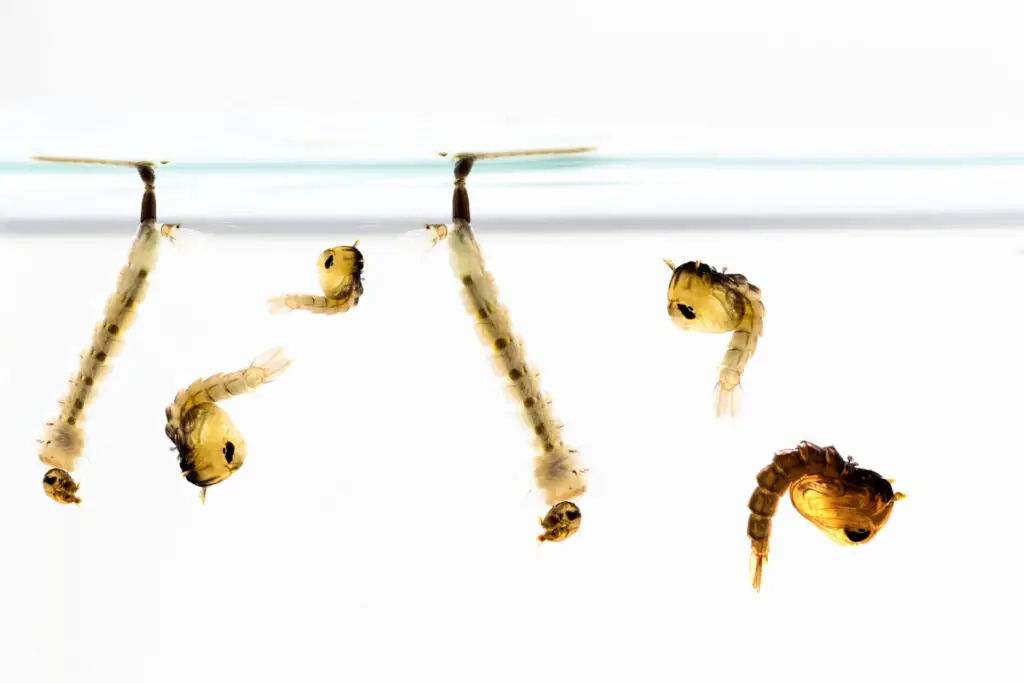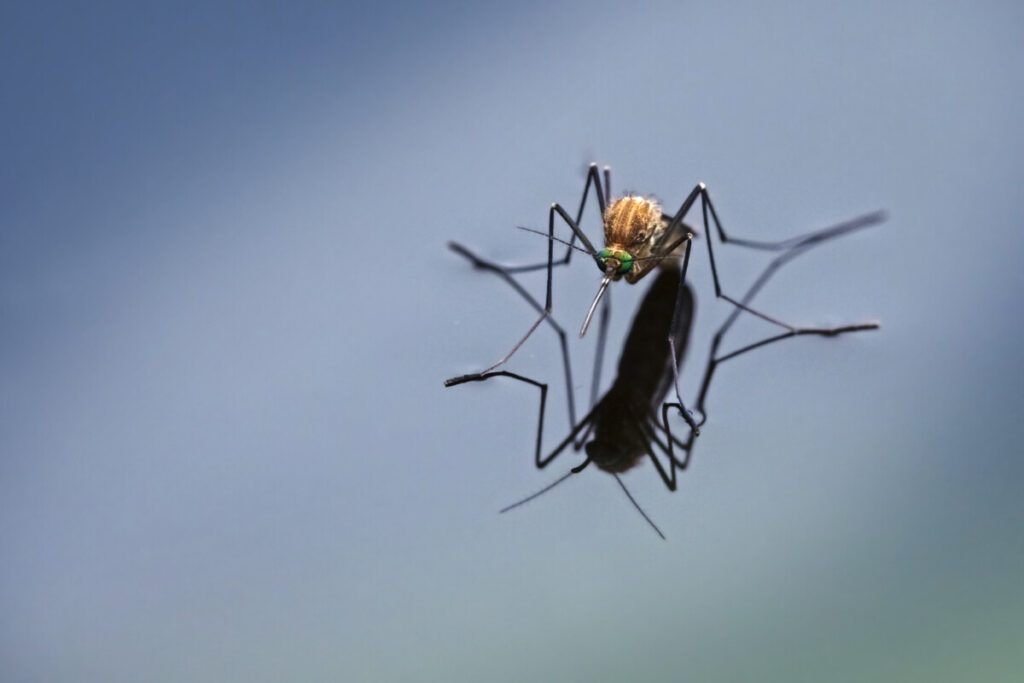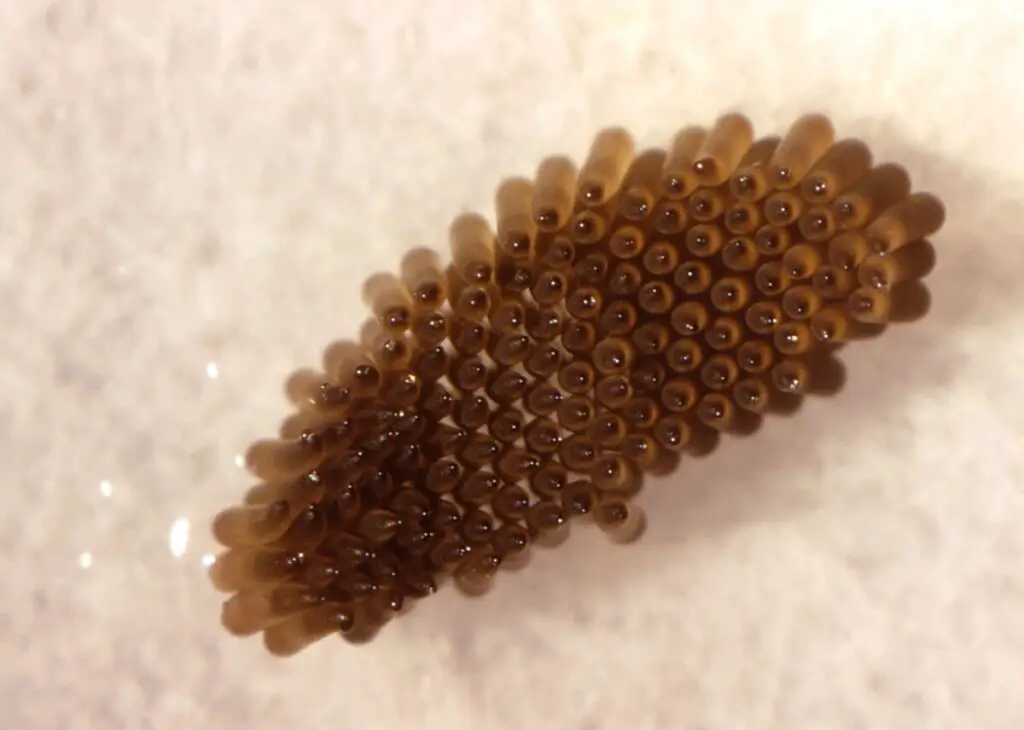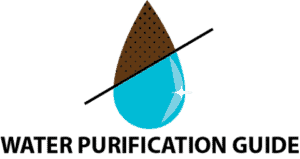Mosquitoes can lay up to 400 eggs at a time which makes them a rapidly growing nuisance in any environment. A pool should serve as a place for relaxation, entertainment, and pure joy. This expected comfort can be cut short or completely prevented when you find out your pool has been infested with mosquitoes, and you will want to kill them, and their larvae quickly.
The best way to kill mosquitoes is to get them at their larvae stage. Industrial preparations like methoprene granules and mosquito dunks are effective at killing mosquitoes in pools. Household products like mineral oils, cinnamon and bleach can also be used to kill mosquitoes.
This guide covers everything you need to know about the mosquito life cycle and how to completely eradicate them from your swimming pool. You’ll also learn some preventive measures to prevent a second infestation, to make sure you have a pool experience with zero bites and itches from mosquitoes.
How mosquitoes get into pool water
The mosquitoes’ life cycle has four stages of development: the egg, larvae, pupa and adult stage. This cycle takes less than two weeks to complete, and then the adults breed again and the cycle continues.
These creatures multiply so fast that if you’re not careful, your pool could become a comfortable breeding zone, especially if you don’t use it often.
If you have mosquitoes in a frog or fish pond, read this post to get rid of them safely. The methods to remove them is different to pools, so you don’t want to harm the fish or frogs that live in them.
Mosquitoes thrive in areas with stagnant or still water, bad smell, carbon dioxide, and favorable (warm) temperature. They are capable of laying about 400 eggs at a time, and these conditions allow for rapid development.
Now imagine a pool you haven’t used or cleaned for a long time, it will definitely be attractive enough to the female adults to want to lay their eggs.

You can confirm the presence of mosquito larvae in your pool if you notice pin-like structures wiggling or hanging upside down near the surface of your pool.

Adult mosquitoes are much easier to find since they stay on the surface of the pool.

The presence of mosquitoes’ egg rafts on the pool surface can also be an indication that some breeders are about to take over your pool.
Now that you’re familiar with mosquitoes, how do you get rid of them? And how do you know if your kind of pool is especially attractive to mosquitoes?
Different methods to kill mosquito larvae in pool water
Once you’ve confirmed an infestation problem, mosquito genocide is your next best option. Keep in mind that it’s easier to kill the larvae than it is to kill the flying adults. You can invest in commercial larvicides or insecticides specifically made for mosquito larvae.
Larvicides help reduce the adult mosquito population in any area, and can exist in different forms such as liquids, tablets, granules or briquette formulations.
Examples of government approved larvicides are methoprene granules which inhibit larvae maturation, Bti dunks or bits which cause gut poisoning that kills the larvae, and organophosphate insecticides.
The alternative to commercial chemicals is household products that aren’t necessarily chemicals, and whose efficiency cannot be guaranteed. This includes apple cider vinegar, cinnamon, bleach, and mineral oil.
Let’s talk about these methods in more detail.
1. Methoprene granules
Methoprene granules prevent the development of mosquito larvae using a synthetic growth hormone inhibitor. It is widely distributed in the pool and can last up to a month to ensure that the larva never proceeds to the pupa stage.
Scientific research has confirmed the effectiveness of methoprene granules against mosquito development, as well as its environmental safety.
You can now buy methoprene granules from Amazon.
How do you apply this treatment?
- First, know the size of your pool. The instructions on this are usually based on sizes, so having an idea of your pool surface area is a good place to start.
- Wear protective clothing; eye goggles and gloves, preferably. As much as possible, you want to protect your skin from any irritation.
- Measure the appropriate quantity of the granules based on your pool size.
- Sprinkle the measured granules on the pool surface.
- Remove your protective gear and wash yourself thoroughly with soap and water. When washing the clothes used, it’s advisable to separate it from the rest of your laundry, just to be safe.
2. Mosquito dunks and bits
These are small, slowly dissolving rings or bits that are thrown into the pool. They contain a bacteria species known as Bacillus thuringensis isrealensis and are commonly abbreviated as BTI and can be purchased from Amazon as Mosquito Dunks or Mosquito Bits.
Mosquito larvae feed on bacteria within the pool, so introducing these dunks is like providing them with poisoned food that they won’t be able to resist. They ingest them and are afflicted with gut poisoning which eventually kills them. They are very effective and affordable.
This method of eradication does not affect water quality, so it is safe for swimmers and pets. It has been tested for toxicity and its potential to cause diseases in humans and has been registered as “safe to use”. It has even been applied through aerial spraying by government agencies.
Learn more about BTI for mosquito control from the Environmental Protection Agency, EPA.
3. Organophosphate insecticides
These chemicals attack the nervous system of the larvae and adult insects. It can be applied to any kinds of pools and water bodies, and it has a significant larvicidal potential.
These kinds of treatments are best applied by professionals or public health officials who can confirm that the product of choice has been approved for use.
4. Cinnamon oil
Cinnamon oil is an inexpensive kitchen condiment used almost everyday, and has proven to be effective against mosquito larvae (ref 1). Asides from preventing mosquito development, your pool also smells so nice when you’re done with this treatment.
You can prepare a 1% solution by mixing about 8 teaspoons (1.3 fl oz / 40 mL) of pure cinnamon oil with 1 gallon (3.8 L) of water.
This solution can be sprayed on the surface of your pool.
5. Bleach
This is another powerful household product that controls mosquito larvae to a large degree. The drawback is that it can be harmful to wildlife or your pets when used in large amounts.
Bleach works by reducing the food available to the larvae, that is destroying the microorganisms they feed on, and making that location unfit for female adults to lay their eggs. If there’s no eggs, there’ll be no larvae to worry about.
Clorox is a popular germicidal bleach available from Amazon and is sunlight resistant so it lasts longer in your pool.
6. Oil
Using oils creates a thin layer at the surface of your swimming pool. This suffocates the larvae by preventing them from getting enough access to air.
It is effective, but it has a drawback. It could decolorize the pool and make swimming uncomfortable. So, after using this method, you might need to invest in a separate cleaning routine for your pool to remove the oils. In this regard, commercial mosquito control might be a better option than mineral oils.
The environmental protection agency of the United States confirms the ability of mineral oils and monomolecular films as a control method for mosquito larvae.
Do above-ground pools breed mosquitoes more than in-ground pools?
Swimming pools can either be above the ground or in-ground. An in-ground pool is a permanent addition to your home that is preferred in locations that experience more hot weather than the cold. It requires a higher level of financial commitment, for reasons such as its maintenance and actual installation.
An above the ground pool is can be a more temporary pool option that is easy to install and easier to pack up, or a permanent one (depending on the type).
So, which of these pools would encourage more mosquito breeding?
Actually, mosquitoes just love still or stagnant water. That is, regardless of the kind of pool installed, mosquitoes will breed if there’s no activity on it for a while and especially during summer (when its warm).
In other words, your choice of pool is not as important as your maintenance when it comes to mosquitoes. The only advantage that an above the ground pool might offer is, if for any reason, you get tired of cleaning, you can easily pack it up and forget about mosquitoes breeding in your pool.
How to prevent mosquitoes from breeding in the pool water
Have a clean pool
Mosquitoes and clean water don’t mix well. They prefer dirty water bodies, because of the smell which is a survival requirement for them.
You can achieve this by running your water filter for a few hours a day, using the skimmer to remove floating objects, and practicing backwashing at least weekly (flushing the pool filter by reversing the flow).
Keep your pool water moving
Again, remember that if the water is stagnant or still, it’s attractive to mosquitoes. Therefore, installing the right kind of pumps that create constant vibration in the pool water surface will prevent the female adult from landing, and of course, laying the eggs.
While this is an effective measure, it won’t do much good if there’s already eggs in the pool.
Keep vegetation to the barest minimum
Note that mosquitoes don’t need an elaborate water body to breed and grow their population. Any environment with suitable conditions is enough.
Vegetation around the pool area provides warmth; an important condition for mosquito breeding. You want to ensure that you trim all surrounding vegetation to the barest minimum.
Use a secure pool cover
Using a cover prevents useful pool chemicals from evaporating, and insects from landing. However, your pool cover is only effective when it’s secure.
This means performing thorough checkups for tears, rifts, and gaps that can give pool access to mosquitoes. It also means draining the pool cover such that it doesn’t also serve as a breeding center, especially during the rainy season.
Use natural repellents
This method keeps mosquitoes away from your swimming pool. Natural remedies like citronella oils, candles or lanterns are known to disguise human odor, which is also attractive to mosquitoes.
You can also invest in mosquito-repellent plants like rosemary, basil, mint, citronella scented geraniums, marigold and lavender to keep them away from the pool area and your environment in general.
Chlorinate
This does more of maintaining the pool health by preventing algal growth which otherwise would encourage mosquito breeding. Pool chlorine, such as Clorox, can stunt the growth of mosquito larvae by reducing their food source – algae and other microorganisms – but doesn’t necessarily kill all of them.
Pairing this method with filtration and general cleaning will yield the best result. Also, try not to use chlorine in excess (pool shocking), especially if you or others swim very frequently. More on pool shocking later.
Get rid of the pool
Not a very popular opinion, but it works. If you don’t see yourself using the pool again, it’s best to pack it up and relieve yourself of worrying about mosquitoes invading it.
This might be easier for above the ground pools, but it’s not impossible for in-ground pools. When you make that decision, just get professional help. You’ll be surprised at how fast it is to dismantle or fill it in.
How to get rid of mosquitoes around your pool cover
Pool covers are supposed to protect your swimming pool from temperature variations, leaf matter, and mosquito infestations. But did you know that they can as well be attractive for mosquitoes?
After it rains, or sometimes after you run your sprinkler – depending on its location – water can accumulate on your pool cover. After a few hours, or if you’re lucky, days of inactivity, mosquitoes will eventually spot that area as a favorable breeding space. You want to prevent this by promptly draining the water off the pool cover after the rain showers might have stopped.
There’s also the possibility of leaves falling and accumulating on your pool cover. If there’s even a slight chance for stagnant water around the leaf area, and there usually is, that’s also a go ahead for lurking adult female mosquitoes to lay their eggs.
Ultimately, to prevent mosquitoes from choosing your pool cover as a breeding area, you want to take care of it and make it as unsuitable as possible for their growth. A good pool cover pump can help maintain a mosquito-free zone on your pool cover.
Does pool shock kill mosquito larvae?
As opposed to the word “shocking”, pool shocking has nothing to do with electricity. It is simply a process of super chlorinating your pool with either chlorine granules or liquid chlorine. It is a straightforward technique that can be done by any pool owner with the right guidance.
Chlorinating your pool is a means of decontamination; you can get rid of algae and microorganisms as well as reducing mosquito larvae populations. It reduces or totally eradicates algal growth and prevents your pool surface from getting cloudy. These two conditions, if not managed, can encourage mosquito breeding and larvae development.
Pool shock might not completely kill the larvae population within your pool, but its consistent application can significantly reduce them.
Conclusion
Mosquitoes are disease causing creatures that wreak havoc any time of the day. As tiny as they are, they can turn your entire water-filled paradise into a total nightmare. Battling mosquitoes at their larva stage is easier and more effective than targeting the agile flying adults.
These tips and techniques are detailed enough to keep them away from you and your pool for as long as you want, to a reasonable extent. And if at any point you feel like these methods aren’t working, then it’s time to seek professional help.
References:
2. Cheng, S.S., Liu, J.Y., Tsai, K.H., Chen, W.J. and Chang, S.T., 2004. Chemical composition and mosquito larvicidal activity of essential oils from leaves of different Cinnamomum osmophloeum provenances. Journal of agricultural and food chemistry, 52(14), pp.4395-4400. <https://doi.org/10.1021/jf0497152>
